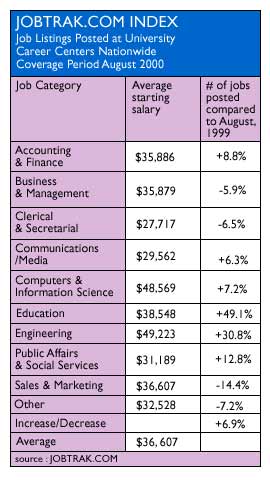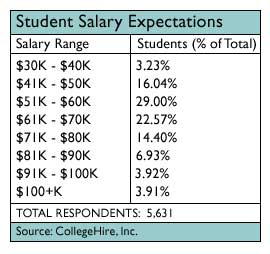|
Grads give third degree
|
 |
October 2, 2000: 7:27 p.m. ET
Employee shortage makes college students hot properties
By Staff Writer Rob Lenihan
|
NEW YORK (CNNfn) - Your parents always said a college education would pay off, but they probably didn't know how much.
The strong economy, combined with the tight labor market, has created a chronic need for bodies and companies are hitting college campuses like invading armies in their attempt to nab the best brains in town. Experts say big salaries, stock options, and benefits are all part of the recruitment arsenal.
"We're seeing employers hit college campuses harder than ever before," said Ken Ramberg, co-founder of JOBTRAK.COM, an online job listing for students and alumni. 
JOBTRAK conducted a survey of college students and recent graduates that found 30 percent of students expected to have four or more job offers by the time they graduate.
The pursuit of higher education has sparked greater expectations. OBTRAK found 52 percent of college students and recent grads polled expect to be millionaires by the time they are 40 years old and 25 percent expected to knock out their first million bucks before they reach 30 -- without Regis Philbin's help.
"The students have a lot of options, so they can take their time in picking what companies they want to work for," said Roberto Angulo, founder and chief executive officer of AfterCollege Inc., an online recruiting site. "There's a shortage of people and companies are scrambling."
What do they want?
Naming the hot field of study can be pretty easy given the current climate on campus -- they're all hot. To be sure, engineering and computer science continue to pull big numbers, but experts say the corporate recruiters are spreading a much wider net. 
"No field isn't hot enough for college students," Ramberg said, "even English majors."
The JOBTRAK index bears this out. While the number of engineering jobs posted for college grads in August was up nearly 31 percent compared to the year-ago period, the number of education jobs posted rose by more than 49 percent compared to August 1999.
"A number of older teachers are retiring," Ramberg said. "Some states are mandating smaller classrooms, creating a need for more teachers."
About the only field that registered a downturn in postings was sales and marketing, which dropped 14.4 percent from the previous year.
"A lot of employers with computer jobs are looking for psychology and music majors," Ramberg said. "Students majoring in those two areas often show an affinity for computer sciences."
Of course, the information technology field needs people big-time. The Information Technology Association of America reports that hiring managers see a shortfall of about 850,000 skilled IT workers over the next year. The association also found that companies took an average of almost 37 percent longer to fill IT jobs than non-IT jobs.
"Technology changes so fast today," said Bill Sebra, CEO of Knowledge Workers Inc., which specializes in the recruitment and retention of high tech professionals. "Often some of the folks who are most up to speed are relatively entry-level people. Technology has moved into every aspect of life."
What they expect
Recruiting company CollegeHire, which matches college grads and high-tech companies, said more than 80 percent of engineering and computer science students entering their final year of college expect to earn higher salaries than last year's graduates.
More than half of the responde  nts said they expected to earn between $51,000 and $70,000 in their first job. Graduates of the same programs earned an average of $47,000 last year. nts said they expected to earn between $51,000 and $70,000 in their first job. Graduates of the same programs earned an average of $47,000 last year.
"This says a lot about where the market is heading," Jeff Daniel, CEO and founder of CollegeHire, said in a statement. "Since the stock market shakeup, students don't want to put too much weight on options. They want the money up front."
While stock options are still important to jobseekers, Sebra said employees have a better understanding of stock options and are not as easily swayed as they had been in the past.
Strike the balance
Sebra said job content -- do you like what you do? -- is the key factor that keeps people in a company or sends them somewhere else. This came ahead of work environment and money.
"There are so many opportunities out there today," he said, "if your job is not exciting, then you're going to change jobs."
Sebra said job seekers should look at such factors as training. One company may offer you $5,000 more per year than another, but if that second company offers training in your field, it might offer a much greater return down the road.
JOBTRAK said that of more than 2,000 college students and recent grads surveyed, 42 percent put the work/personal life balance ahead of money, advancement potential and location.
Ramberg encouraged students who feel overwhelmed by a wave of job offers to take their time making their decision. Don't be stampeded into making a choice, he said.
"They have to look beyond the money and the stock options and the bonuses," he said. "They have to see if the company has the kind of corporate culture they're looking for because that's where they'll be spending most of their awake hours." 
|
|
|
|
|
 |

|

